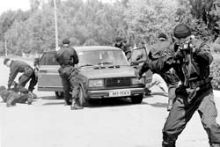June 24 saw the third regular rotation of the Ukrainian special UN peacekeeping police force in Kosovo. Shortly earlier, the 112 dog squad policemen, members of the rapid deployment unit, and future UN police observers awaiting the flight to Gniljani (Ukrainian policemen see service in the US sector in eastern Kosovo), took their final exam before journalists. After successfully demonstrating hand-to-hand combat techniques, checking motor transport, and simulating VIP guard duty, Ihor Kyrychenko, chief of the education division with the Ministry of Internal Affairs personnel department, informed the journalists that all special unit fighters had undergone all needed training and were fully prepared for action in Kosovo. He also assured the press that in addition to acquiring skills in the use of force, all the servicemen had undergone a special psychology course, studied the ethical and cultural features of their country of destination, as well as the requisite laws and norms. In his words, these stringent requirements for mission participants result from the necessity to bring the Ukrainian police practice into line with UN regulations such as those on not violating human rights. Now, Mr. Kyrychenko says, ‘’the servicemen are prepared to fulfill their tasks, including round-the-clock patrolling of the area they are in charge of, protection and defense of international mission members in Kosovo, and suppression of mass disturbances. In addition, most of the personnel being sent speak fluent English. For, Mr. Kyrychenko pointed out, they will have to be in constant contact with the local population and their counterparts from other UN mission units. Incidentally, Mr. Kyrychenko claims the latter have a positive opinion of the Ukrainian peacekeepers and call them the best-trained and disciplined unit. That the Ukrainian unit is constantly having its Kosovo mandate renewed also confirms this appraisal.
According to Dmytro Oshchepkov, chief of the department’s peacekeeping division, all the men have undergone serious psychological training and testing. The point is that anything can happen in the line of duty, and the first document all the peacekeepers will have to make out on arrival at the place of destination is their will, he said. Yet, these difficulties do not frighten the departing Ukrainians, with four applications per place in the police peacekeeping units. In addition, as The Day was told by First Lieutenant Oleksandr Novytsky, deputy commander of the second platoon, all the peacekeepers are specialists and professionals, with Titan and Sokil special purpose unit personnel accounting for 80% of the total strength. Thus they are all prepared to carry out the mission. Also important is the material factor: the mission pays $950-1000.
All we can wish the Ukrainian policemen is to apply their knowledge and experience in this country after they come back home. Units like this should not be solely an export product to create a positive image of Ukraine abroad.
The Day’s Reference
The first Ukrainian special purpose peacekeeping police unit is part of a special UN mission which, together with the UN civil police contingent, forms the UN international police in Kosovo. The unit, consisting of three 32-man platoons, was sent to Kosovo on September 20, 2000.







